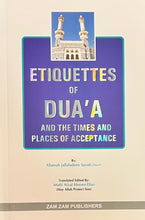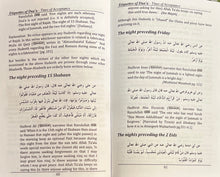From The Urdu translation of the Original Arabic entitled.
Assihamul isabah fid da'wawaatil majabah
Etiquettes of Dua'a and the Times and Places of Acceptance
By Allahmah Jalalluddeen Suyuti
Translated by: Mufti Afzal Hossen Elias
Zam Zam Publisher
First Translated into Urdu By Maulana Saeed Muhammad Rashid Madani
Dua'a is a great act of Ibadah (worship), which Allah has granted to the ummah (followers) of Rasul (S). It is an act of Ibadah which creates a direct link between a person and Allah. It makes a person realize that Allah is the only One who can fulfil his needs.
Imam Suyuti Says in the introduction
'There are many motivating factors for the acceptance of Dua'a Either there us a quality in the person making Dua'a, some virtues regarding the time, some importance concerning the place or some loftiness in the wordings of Dua'a which occur in the noble Ahadeeth'
Jalalluddeen Suyuti al-Shafi`i al-Ash`ari, also known as Ibn al-Asyuti 849-911AH /1445-1505),, the mujtahid imam and renewer of the tenth Islamic century, foremost hadith master, encyclopedist, historian, and biographer and probably one of the most prolific of all Islamic writers. There are an enormous number of his essays and treatises preserved today. A number of his writings concerned scientific topics or issues related to natural science and food and regimen, amongst other things
From Asyut in Egypt,he was among the most renowned and prolific Muslim scholars of all time. He wrote more than 300 books, covering every aspect of the Islamic sciences. He memorized the Quran at the age of eight, and then went on to study with more than 150 scholars. He travelled extensively in his quest for knowledge to Damascus, Hijaz, Yemen, India, Morocco, and the lands south of Morocco, as well as in Egypt.
Al-Suyuti devoted his life to learning, teaching and writing. He was noble, abstinent and self-sufficient, distancing himself from people of rank and power and living on what he earned by teaching. Major writings of al-Suyuti that remain widely used today include al-Itqan, on the Quranic sciences; and Tafsir al-Jalalayn, which he completed when only 22.
From The Urdu translation of the Original Arabic entitled.
Assihamul isabah fid da'wawaatil majabah




